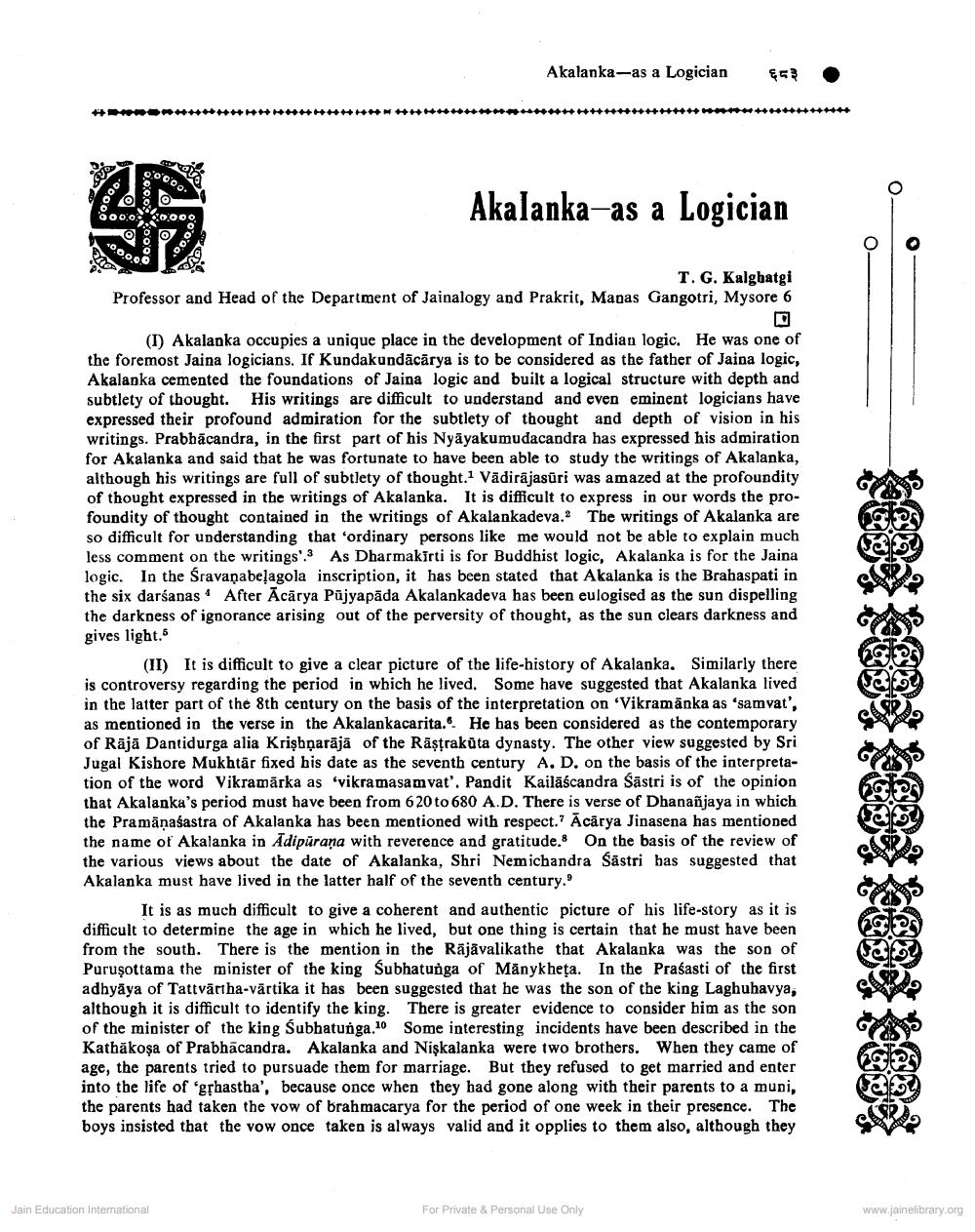________________
Akalanka-as a Logician
3
•
0.00.
0
Akalanka-as a Logician
9000
0.000
T. G. Kalghatgi Professor and Head of the Department of Jainalogy and Prakrit, Manas Gangotri, Mysore 6
(I) Akalanka occupies a unique place in the development of Indian logic. He was one of the foremost Jaina logicians. If Kundakundācārya is to be considered as the father of Jaina logic, Akalanka cemented the foundations of Jaina logic and built a logical structure with depth and subtlety of thought. His writings are difficult to understand and even eminent logicians have expressed their profound admiration for the subtlety of thought and depth of vision in his writings. Prabhācandra, in the first part of his Nyāyakumudacandra has expressed his admiration for Akalanka and said that he was fortunate to have been able to study the writings of Akalanka, although his writings are full of subtlety of thought.1 Vädirājasüri was amazed at the profoundity of thought expressed in the writings of Akalanka. It is difficult to express in our words the profoundity of thought contained in the writings of Akalankadeva. The writings of Akalanka are so difficult for understanding that 'ordinary persons like me would not be able to explain much less comment on the writings'.3 As Dharmakīrti is for Buddhist logic, Akalanka is for the Jaina logic. In the Sravaṇabelagola inscription, it has been stated that Akalanka is the Brahaspati in the six darśanas' After Ācārya Pūjyapāda Akalankadeva has been eulogised as the sun dispelling the darkness of ignorance arising out of the perversity of thought, as the sun clears darkness and gives light.
(II) It is difficult to give a clear picture of the life-history of Akalanka. Similarly there is controversy regarding the period in which he lived. Some have suggested that Akalanka lived in the latter part of the 8th century on the basis of the interpretation on 'Vikramānka as 'samvat', as mentioned in the verse in the Akalankacarita. He has been considered as the contemporary of Rājā Dantidurga alia Krishnarājā of the Rāştrakūta dynasty. The other view suggested by Sri Jugal Kishore Mukhtar fixed his date as the seventh century A, D, on the basis of the interpretation of the word Vikramärka as "vikramasamvat'. Pandit Kailāścandra Šāstri is of the opinion that Akalanka's period must have been from 620 to 680 A.D. There is verse of Dhanañjaya in which the Pramānaśastra of Akalanka has been mentioned with respect. Ācārya Jinasena has mentioned the name of Akalanka in Adipurana with reverence and gratitude. On the basis of the review of the various views about the date of Akalanka, Shri Nemichandra Sastri has suggested that Akalanka must have lived in the latter half of the seventh century.'
It is as much difficult to give a coherent and authentic picture of his life-story as it is difficult to determine the age in which he lived, but one thing is certain that he must have been from the south. There is the mention in the Räjävalikathe that Akalanka was the son of Purusottama the minister of the king Subhatunga of Manykheta. In the Prasasti of the first adhyāya of Tattvättha-värtika it has been suggested that he was the son of the king Laghuhavya, although it is difficult to identify the king. There is greater evidence to consider him as the son of the minister of the king Subhatunga.10 Some interesting incidents have been described in the Kathākoşa of Prabhācandra. Akalanka and Niskalanka were two brothers. When they came of age, the parents tried to pursuade them for marriage. But they refused to get married and enter into the life of 'grhastha', because once when they had gone along with their parents to a muni, the parents had taken the vow of brahmacarya for the period of one week in their presence. The boys insisted that the vow once taken is always valid and it opplies to them also, although they
Jain Education International
For Private & Personal Use Only
www.jainelibrary.org




